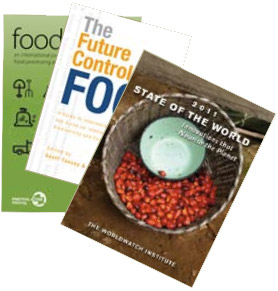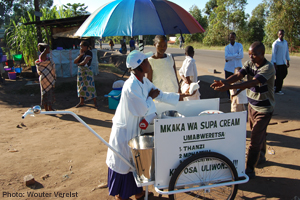AUTHOR
Month: September 2011
Articles
Editorial – Green choices
September 23rd, 2011
Preparations for Rio+20 are now in full swing. In a recent meeting in Paris with experts from all over the world (among them several farmer leaders), FAO and OECD discussed the roadmap towards a Green Economy with Agriculture. It was widely agreed that the lack of sustainability of current food and agriculture systems makes change … Read more
Opinion: And now, José?
September 23rd, 2011
FAO’s new Director General won’t have an easy job, but still “we have hope”, says Francisco Caporal. Since FAO’s mandate is “to achieve food security for all and ensure that people have regular access to good quality food”, it would be great to see if José Graziano da Silva has read the reports of his … Read more
Aiming at more sustainable diets
September 23rd, 2011
Our global food system is under enormous stress and there has never been a more urgent time for collective action to address food and nutrition security globally. New, sustainable approaches to improving the quality and variety of food produced and consumed around the world are needed, and nutrition must be front and centre as a … Read more
Call for articles: Friends or foes? Our love/ hate relationship with insects
September 23rd, 2011
Insects pollinate crops, are a source of food and other products and work as natural predators in the field. Yet insects often have a negative reputation in agriculture, with the words “insects” and “pests” often used interchangeably. Billions of dollars are spent every year fighting them. Insect populations are affected, sometimes seriously, by many different … Read more
Breaking down barriers to intra-regional trade
September 23rd, 2011
Getting produce to market at the right moment and in the best condition is the priority for producers. It is at this moment when the farmer can reap the rewards of months or years of hard work and investment. After having successfully negotiated weather conditions or animal health issues, getting the produce to market should … Read more
Learning about … Going Local
September 23rd, 2011
Following the motto “education for action”, the International Society for Ecology and Culture (ISEC) has developed several educational programmes that pursue a twofold objective. The first is to show how the economic globalisation process is detrimental for the natural environment. The second is to persuade people that, to quote Steven Gorelick, US Programme Director, “the … Read more
 Mind! New in print / More on regional food systems
September 23rd, 2011
Mind! New in print / More on regional food systems
September 23rd, 2011
Value chains, social inclusion and economic development: Contrasting theories and realities A.H.J. Helmsing and S. Vellema (eds.), 2011. Routledge. 294 pages. Growing a better future: Food justice in a resource-constrained world R. Bailey, 2011. Oxfam, London. 73 pages. Agriculture and food in crisis: Conflict, resistance, and renewal F. Magdoff and B. Tokar (eds.), 2010. Monthly … Read more
 Locally rooted: Ideas and initiatives from the field
September 23rd, 2011
Locally rooted: Ideas and initiatives from the field
September 23rd, 2011
Regional food systems develop around the crops grown in a particular area. Yet other “ingredients” are also needed to help the different stakeholders connect to each other, whether these are other economic activities or alternative approaches. Here are just a few examples from different countries. Brazil: Planning at the micro level Many farmers who live … Read more
 Globally connected: Our role as consumers
September 23rd, 2011
Globally connected: Our role as consumers
September 23rd, 2011
While only part of the world’s population is directly involved in producing food, we are all part of the world’s food systems. Whether in the rural areas or in an urban setting, in more or in less industrialised countries, we are all involved – as consumers. What choices do consumers have? Can we, as consumers, … Read more
Opinion: The potential of food reserves
September 23rd, 2011
Peter Gubbels looks at the potential of food reserves. In the Sahel, increased food reserves and buffer stocks at the regional, national and local levels can be a valuable tool for improving access to food and for stabilising food prices. Purchasing locally produced foodstuffs when prices are low, and selling when prices are high, can … Read more
Month: September 2011
Preparations for Rio+20 are now in full swing. In a recent meeting in Paris with experts from all over the world (among them several farmer leaders), FAO and OECD discussed the roadmap towards a Green Economy with Agriculture. It was widely agreed that the lack of sustainability of current food and agriculture systems makes change … Read more
FAO’s new Director General won’t have an easy job, but still “we have hope”, says Francisco Caporal. Since FAO’s mandate is “to achieve food security for all and ensure that people have regular access to good quality food”, it would be great to see if José Graziano da Silva has read the reports of his … Read more
Our global food system is under enormous stress and there has never been a more urgent time for collective action to address food and nutrition security globally. New, sustainable approaches to improving the quality and variety of food produced and consumed around the world are needed, and nutrition must be front and centre as a … Read more
Insects pollinate crops, are a source of food and other products and work as natural predators in the field. Yet insects often have a negative reputation in agriculture, with the words “insects” and “pests” often used interchangeably. Billions of dollars are spent every year fighting them. Insect populations are affected, sometimes seriously, by many different … Read more
Getting produce to market at the right moment and in the best condition is the priority for producers. It is at this moment when the farmer can reap the rewards of months or years of hard work and investment. After having successfully negotiated weather conditions or animal health issues, getting the produce to market should … Read more
Following the motto “education for action”, the International Society for Ecology and Culture (ISEC) has developed several educational programmes that pursue a twofold objective. The first is to show how the economic globalisation process is detrimental for the natural environment. The second is to persuade people that, to quote Steven Gorelick, US Programme Director, “the … Read more
 Mind! New in print / More on regional food systems
Mind! New in print / More on regional food systems
Value chains, social inclusion and economic development: Contrasting theories and realities A.H.J. Helmsing and S. Vellema (eds.), 2011. Routledge. 294 pages. Growing a better future: Food justice in a resource-constrained world R. Bailey, 2011. Oxfam, London. 73 pages. Agriculture and food in crisis: Conflict, resistance, and renewal F. Magdoff and B. Tokar (eds.), 2010. Monthly … Read more
 Locally rooted: Ideas and initiatives from the field
Locally rooted: Ideas and initiatives from the field
Regional food systems develop around the crops grown in a particular area. Yet other “ingredients” are also needed to help the different stakeholders connect to each other, whether these are other economic activities or alternative approaches. Here are just a few examples from different countries. Brazil: Planning at the micro level Many farmers who live … Read more
 Globally connected: Our role as consumers
Globally connected: Our role as consumers
While only part of the world’s population is directly involved in producing food, we are all part of the world’s food systems. Whether in the rural areas or in an urban setting, in more or in less industrialised countries, we are all involved – as consumers. What choices do consumers have? Can we, as consumers, … Read more
Peter Gubbels looks at the potential of food reserves. In the Sahel, increased food reserves and buffer stocks at the regional, national and local levels can be a valuable tool for improving access to food and for stabilising food prices. Purchasing locally produced foodstuffs when prices are low, and selling when prices are high, can … Read more
